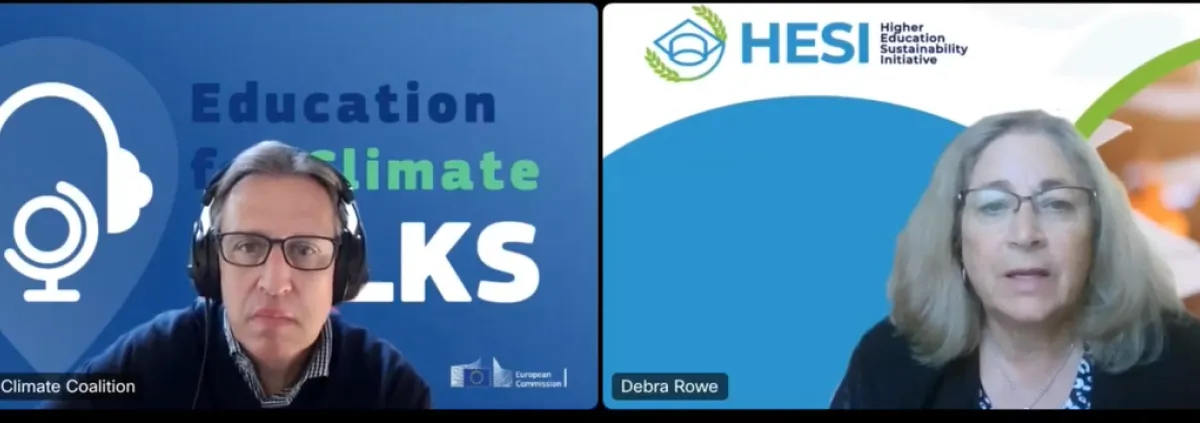Debra Rowe is since 2 decades the President of the US Partnership for Education for Sustainable Development that consists of individuals, organizations and institutions in the United States dedicated to education for sustainable development.
Debra is also collaborating with 10 UN agencies on the same issues related to greening the workforce.
In this fascinating interview, she shares with us what she sees as the main trends and challenges facing sustainable education, which are slowing down the process of training young students who will soon become professionals in need of sustainability skills.
She also shares some solutions and resources with us: a super-rich list that you can find in the description of the video below.
There are too many ideas and resources shared in this interview to pick out one thing above the others, because everything Debra tells us is worth sharing. It's also because the complexity of the challenge of educating students about sustainability means that we can't consider that a single solution is sufficient when we have to work on several fronts.
You'd do well to listen carefully to Debra and continue to act of course, because while there's still a lot to do, there's also reason to be hopeful and confident, and the resources Debra shares with us will help you to work better, collaborate better, and ultimately give people the opportunities they deserve.
Questions:
01:30 Who are you, what has been your journey into green education?/
07:30 Based on your long experience, what are the main trends and challenges we face?
14:55 Could you share with us specific tools/schemes that could help us address these trends and challenges?
Resources List from Debra Rowe:
- Education for Green Jobs - Summits, Resources and Tools:
Via our work with the Clean Energy Ministerial, see a set of strategies, a coalition design for workforce development, and a compilation of the policies and programs in this toolkit. The toolkit was recently shared with participants from over 100 countries during a series of Solutions Summits with a focus on workforce development policies and programs for an inclusive, clean energy transition. Resources include but are not limited to:
- the self-assessment process within the Greening TVET tool supported by ILO and its work in multiple countries for green economy workforce development
- the UNEP and US Partnership co-authored Global Guidance Document on Education for Green Jobs
- many other useful documents on the resources list
- Change agents:
- See how students have come together in large coalitions to develop the curricular that they found was missing in their education. The emphasis seems to be on moving beyond the doom and gloom of climate change to learning how to be change agents within our societies so graduates can take to scale the solutions we need. For example, see Become an Environmental Changemaker course and modules that are freely available to all educators (scroll down to access module titles)
- SISL - Sustainability Improves Student Learning, created by a coalition of STEM academic societies about integrating sustainability into programs and curricula in all academic areas, with a focus on key components of quality sustainability assignments and student empowerment to help students become sustainability change agents.
- Institutionalize Sustainability: Strategies to help institutionalize sustainability across all areas of the university from the the Disciplinary Associations Network for Sustainability’s (DANS) initiatives about:
- integrating sustainability into job descriptions and performance, reviews - https://www.aashe.org/wp-content/uploads/2019/07/Updated-HEASC-Call-to-Action-Sustainability-in-Job-Descriptions-and-Performance-Reviews.pdf and
- integrating sustainability and specific green skills topics (e.g. heat pumps, building energy efficiency) into textbooks - contact us for more details
Key competencies: Global Council for Science and the Environment Sustainability Education Program - an initiative focusing on key competencies in sustainable development education and pathways to accreditation based on published academic literature. This is useful for specific sustainability programs, and also for all academic areas as they integrate in sustainable development.
- Networks across institutions: For 20 years, there has been an effort to integrate sustainability into the core professional development offerings as part of the norm for faculty and staff in higher education, not as an “extra”. See HEASC, the Higher Education Associations Sustainability Consortium, and DANS - the Disciplinary Associations Network for Sustainability for more details and resources for all academic, operational and other staff areas in higher education.
- HESI: The Higher Education Sustainability Initiative - HESI, a collaboration of ten United Nation agencies and higher education institutions and networks for sustainability that includes:
- Academic research and educational materials alignment with the sustainable development goals for more implementation of solutions to our urgent societal issues. This initiative also has a focus to create better connections between academics, including academic publishers, with practitioners and policy makers and their organizations. See HESI’s SDG Compact Fellows and the newly updated and very practical Top Action Tips. Here is a University World News article describing the importance of the Top Action Tips
- HESI convening of accreditation agencies globally to include sustainability and green skilling criteria into accreditation requirements, scheduled for November of 2024. If you are working with an accreditation organization or standards for a curricular program that are not yet including sustainability and green skilling as criteria, let us know their information at greenjobscollab@gmail.com
Are you interested to watch previous episodes? Check the Education for Climate TALK


By clicking show content, you agree to load the embedded content from "Vimeo" and therefore its privacy policy.